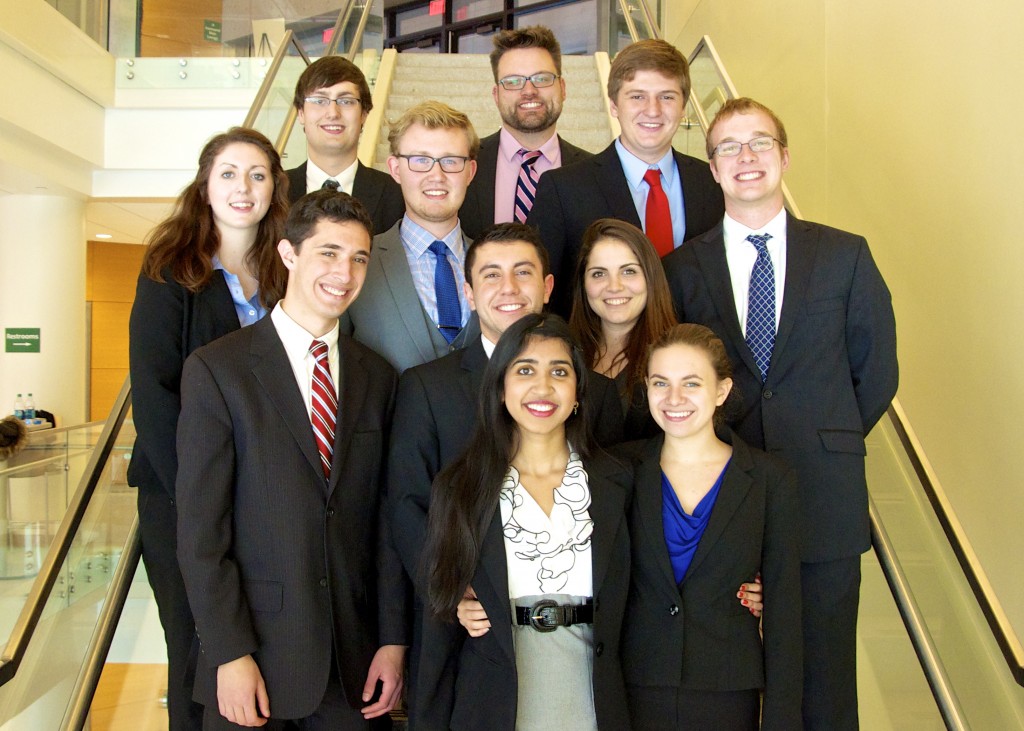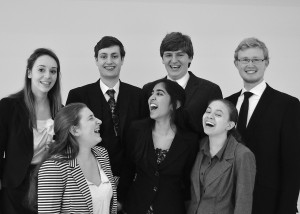
In 2013, UConn students worked with Pre-Law advisor Dr. Edward F. Kammerer, Jr. to launch an undergraduate UConn Moot Court Competition team, and in only its second year, a team of two students has earned a spot in the national competition at Florida International University College of Law this January 2015.
Luke LaRosa ’16 (CLAS) and Snigdha Mamillapalli ’16 (BUSN) are junior Honors students and members of the Special Program in Law. They are one of five teams (of two) that UConn sent to the Eastern Regional qualifying competition this past November in Fitchburg, Mass. In addition to his place at nationals, LaRosa also earned a “Top Orator” honor, which is awarded to the top ten debaters. He placed fourth out of the 124 competitors.
Fellow UConn Moot Court team members are Santorini Rivera ’16 (CLAS), Christopher Baker ’16 (CLAS), Leon Peschel ’16 (BUSN), Katie Cavanaugh ’17 (CLAS), Danielle Ullo ’17 (CLAS), Alexander Loukellis ’17 (BUSN), Ryan Norton ’17 (CLAS), and Jared Quigley ’18 (CLAS), all Honors students. These UConn undergraduates debated against more than 120 students across the region in Fitchburg. Many of these students were also part of Moot Court in its first year, including LaRosa and Mamillapalli.
While Moot Court competitions are common in law school, they are growing in popularity at the undergraduate level. “Moot Court teaches legal reasoning, but it also stresses critical analysis, public speaking, and flexibility,” says Kammerer. “A student may have a perfectly rehearsed speech, but a judge will interrupt at any moment, even mid-sentence. A team prepares for this by thoroughly understanding every aspect of the case and the arguments. Students cannot be tied to planned arguments. The judges’ questions require students to adapt their arguments to those questions. It takes skill and quick thinking, combined with knowledge of the case and the law to succeed during Moot Court.”
Each year, the mock appellate court case alternates between civil and criminal. This year’s Moot Court issue was abortion. Cases are generally hot topics intended to pique students’ interest and keep them engaged throughout the rigorous preparation. During the tournament, each member of the two-person team debates different precedents of existing case law, as they present originally crafted arguments related to the same issue. The UConn Moot Court team practiced weekly during the semester, and almost daily in the last days leading up to the competition. During the tournament, each team member has ten minutes to present his or her argument.
“Moot Court is a lot of work, but its benefits extend well-beyond the competitions,” says LaRosa. “I’ve been able to apply the skills I’ve learned to other courses and projects, including those not legally oriented. Moot Court helps me, and I think all of us on the team, think more critically about how we construct arguments on any topic.“ LaRosa is originally from Central Vermont and has interests in regional planning, land use law, and public policy. He is majoring in Urban and Community Studies as well as Geography, and is also a member of the Master’s in Public Administration Fast-Track Program. In addition to competing with the UConn Moot Court team, LaRosa works at the UConn Writing Center, interns with the Connecticut State Data Center, and is currently engaged in research regarding urban neighborhood development in Hartford. He was also a 2013 Holster Scholar and was recently named a member of the competitive Leadership Legacy Experience program. LaRosa’s career goals include working in regional planning with an emphasis in land use law and policy.
Mamillapalli is a Connecticut resident who majors in Management Information Systems and Philosophy. She is a resident assistant, a mentor with Peer Allies Through Honors student group, and secretary for UConn Change Lives (which raises money for children in Bangladesh, Nepal, and India). She has earned various scholarships, held several internships (including those in the legal field), and speaks multiple languages. Mamillapalli plans to attend law school after completing her undergraduate degree. “What first interested me about Moot Court was the opportunity to develop my public speaking skills while focusing on constitutional issues. There’s nothing quite like getting up in front of a panel of real judges and attorneys, and having them interrupt and question the argument you’ve developed for months. It’s definitely a challenge and a thrill that has advanced my critical thinking skills,” says Mamillapalli.
The UConn Moot Court team is a Tier II student organization, receiving partial funding through USG. Membership is open to all undergraduate students. The team hopes to send several students to the national tournament event in Miami this January to support LaRosa and Mamillapalli, but also to continue the lessons learned from the Moot Court experience.
The tournament is hosted by the American Collegiate Moot Court Association.

